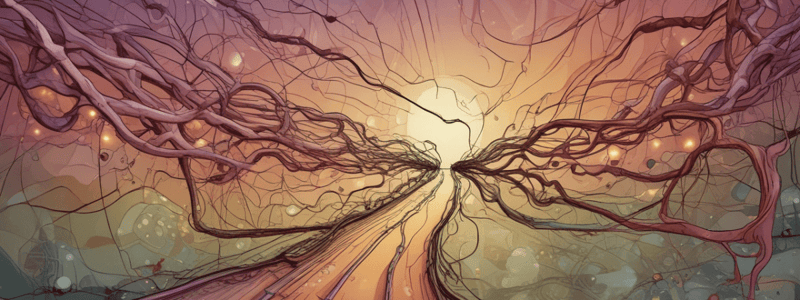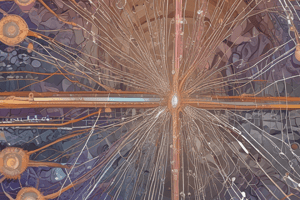Podcast
Questions and Answers
What type of stimuli do nociceptors respond to?
What type of stimuli do nociceptors respond to?
What is the form of nociceptors histologically?
What is the form of nociceptors histologically?
What is the mechanism of transduction in nociceptors?
What is the mechanism of transduction in nociceptors?
Where do nociceptors transmit signals to in the spinal cord?
Where do nociceptors transmit signals to in the spinal cord?
Signup and view all the answers
What is the role of calcium ions in generator potentials?
What is the role of calcium ions in generator potentials?
Signup and view all the answers
What is the function of mediators in nociceptors?
What is the function of mediators in nociceptors?
Signup and view all the answers
What is the effect of mediators on the receptor in nociceptors?
What is the effect of mediators on the receptor in nociceptors?
Signup and view all the answers
What is the route of transmission of signals from nociceptors?
What is the route of transmission of signals from nociceptors?
Signup and view all the answers
What type of fiberspredominate in the trigeminal nerve?
What type of fiberspredominate in the trigeminal nerve?
Signup and view all the answers
What is the location of the ganglion of the trigeminal nerve?
What is the location of the ganglion of the trigeminal nerve?
Signup and view all the answers
What is the pathway for nociceptive inputs from the trigeminal nerve?
What is the pathway for nociceptive inputs from the trigeminal nerve?
Signup and view all the answers
What is the characteristic of pain localisation from the skin surface?
What is the characteristic of pain localisation from the skin surface?
Signup and view all the answers
What is the characteristic of pain localisation from deeper structures?
What is the characteristic of pain localisation from deeper structures?
Signup and view all the answers
What is the unique feature of the trigeminal nerve in terms of sensory perception from within the tooth pulp?
What is the unique feature of the trigeminal nerve in terms of sensory perception from within the tooth pulp?
Signup and view all the answers
What is the trigeminal nerve broadly analogous to?
What is the trigeminal nerve broadly analogous to?
Signup and view all the answers
What are the three branches of the trigeminal nerve?
What are the three branches of the trigeminal nerve?
Signup and view all the answers
What type of pain is associated with autonomic responses?
What type of pain is associated with autonomic responses?
Signup and view all the answers
What is the result of stimulation of thalamic nuclei?
What is the result of stimulation of thalamic nuclei?
Signup and view all the answers
What is the role of the sensory cortex in pain perception?
What is the role of the sensory cortex in pain perception?
Signup and view all the answers
What is the difference between physiological and affective responses to pain?
What is the difference between physiological and affective responses to pain?
Signup and view all the answers
What is the consequence of missing experiences in early childhood in terms of pain responses?
What is the consequence of missing experiences in early childhood in terms of pain responses?
Signup and view all the answers
What is congenital insensitivity to pain characterized by?
What is congenital insensitivity to pain characterized by?
Signup and view all the answers
What is the result of stimulation of the reticular formation?
What is the result of stimulation of the reticular formation?
Signup and view all the answers
What type of pain is described as 'sharp, well localized, and fades quickly'?
What type of pain is described as 'sharp, well localized, and fades quickly'?
Signup and view all the answers
What can chronic pain produce, apart from emotional effects?
What can chronic pain produce, apart from emotional effects?
Signup and view all the answers
According to the gate theory, what acts as a gate for the sensory input from the trigeminal nerve?
According to the gate theory, what acts as a gate for the sensory input from the trigeminal nerve?
Signup and view all the answers
What is a common feature of chronic pain, regardless of its origin?
What is a common feature of chronic pain, regardless of its origin?
Signup and view all the answers
What is a result of chronic pain over time?
What is a result of chronic pain over time?
Signup and view all the answers
What is the main difference between chronic and acute pain?
What is the main difference between chronic and acute pain?
Signup and view all the answers
What is an example of a condition that can cause chronic pain?
What is an example of a condition that can cause chronic pain?
Signup and view all the answers
What is the result of chronic pain on external pain stimulus?
What is the result of chronic pain on external pain stimulus?
Signup and view all the answers
What is the biopsychosocial model of pain related to the trigeminal nerve?
What is the biopsychosocial model of pain related to the trigeminal nerve?
Signup and view all the answers
Where would a second-order nociceptive neuron from the left lower limb normally synapse onto?
Where would a second-order nociceptive neuron from the left lower limb normally synapse onto?
Signup and view all the answers
Where do C fibres synapse within the spinal cord?
Where do C fibres synapse within the spinal cord?
Signup and view all the answers
What is the result of increasing the size of the receptive fields and receptor density in the forepaws?
What is the result of increasing the size of the receptive fields and receptor density in the forepaws?
Signup and view all the answers
Which of the following changes would NOT increase the sensitivity of the mouse forepaws?
Which of the following changes would NOT increase the sensitivity of the mouse forepaws?
Signup and view all the answers
What is the function of the ventral posterolateral nucleus of the thalamus?
What is the function of the ventral posterolateral nucleus of the thalamus?
Signup and view all the answers
Which of the following is NOT a location where fibres C terminate?
Which of the following is NOT a location where fibres C terminate?
Signup and view all the answers
What is the effect of increasing the receptor density in the forepaws?
What is the effect of increasing the receptor density in the forepaws?
Signup and view all the answers
What is the target of the second-order nociceptive neuron from the lower limb?
What is the target of the second-order nociceptive neuron from the lower limb?
Signup and view all the answers
Study Notes
Nociceptors and Pain Pathways
- Nociceptors specifically respond to harmful stimuli, distinguishing them from receptors for innocuous sensations such as light touch or temperature changes.
- Typically manifest as free nerve endings in tissues like skin, muscle, bone, and teeth.
- Pain pathways consist of four major processes: transduction, transmission, modulation, and perception.
Pain Pathways Breakdown
- Transduction: Activated by stimuli; nociceptors use biochemical mediators (e.g., bradykinin, histamine) to change receptor permeability, leading to action potential generation.
- Transmission: Signals travel via peripheral nerves up the spinal cord (dorsal horn) to the midbrain and sensory cortex.
- Modulation: Changes can occur in the signal before it reaches conscious perception, either enhancing or inhibiting the experience of pain.
- Perception: The conscious awareness of pain, influenced by prior experiences and the emotional context surrounding the pain.
Mechanisms of Nociceptive Activation
- Nociceptive pathways utilize both Aδ (myelinated) and C fibers to convey pain signals.
- Aδ fibers: Fast, conveying sharp, localized pain.
- C fibers: Slow, associated with dull, throbbing pain and autonomic responses.
Trigeminal Nerve Anatomy and Function
- The trigeminal nerve, arising from the pons and medulla, conveys facial pain sensations and has afferent fibers dominating in its structure.
- It branches into three divisions: ophthalmic, maxillary, and mandibular, transmitting nociceptive signals from facial regions.
- Nociceptive inputs from the trigeminal nerve cross to ascend via the spinothalamic (trigeminothalamic) tract to the brain.
Pain Localization and Sensation
- Pain localization is more precise on the skin's surface but less accurate in deeper tissues; deeper structures tend to yield vague pain sensations.
- Sharp pain has a fast onset due to Aδ fibers, while dull pain is slower due to activation of C fibers.
Structures Involved in Pain Perception
- Thalamus: Critical for processing pain sensations; stimulation can evoke intense pain, and interactions with the reticular formation impact arousal related to pain.
- Sensory Cortex: Responsible for interpreting the qualities of pain sensations; disconnecting it from the thalamus does not eliminate pain perception.
Responses and Psychological Impact of Pain
- Physiological responses are linked to nociceptive activation, but affective reactions can vary per individual circumstances.
- Early childhood experiences shape pain response learning; congenital insensitivity to pain might lead to absence of reactions to harmful stimuli.
Chronic Pain Overview
- Chronic pain persists beyond six months and encompasses conditions like arthritis, cancer, and fibromyalgia, with potential emotional effects including anxiety and depression.
- It leads to changes in the central nervous system that may amplify pain signals and contribute to an undesirable learning process regarding pain perception.
Gate Control Theory
- The gate control theory, applicable to the trigeminal nerve, posits that pain signals can be modulated at the spinal level.
- Nucleus caudalis serves as a gate for sensory inputs from the trigeminal nerve, allowing for either inhibitory or stimulatory effects on pain transmission.
Practice Questions
- Engage with supplementary questions to reinforce understanding of nociceptive pathways and anatomical focuses within the pain perception mechanisms.
Studying That Suits You
Use AI to generate personalized quizzes and flashcards to suit your learning preferences.
Related Documents
Description
This quiz covers the basics of pain pathways, including the transduction, transmission, and modulation of pain signals. It also delves into the role of nociceptors in responding to noxious stimuli.




